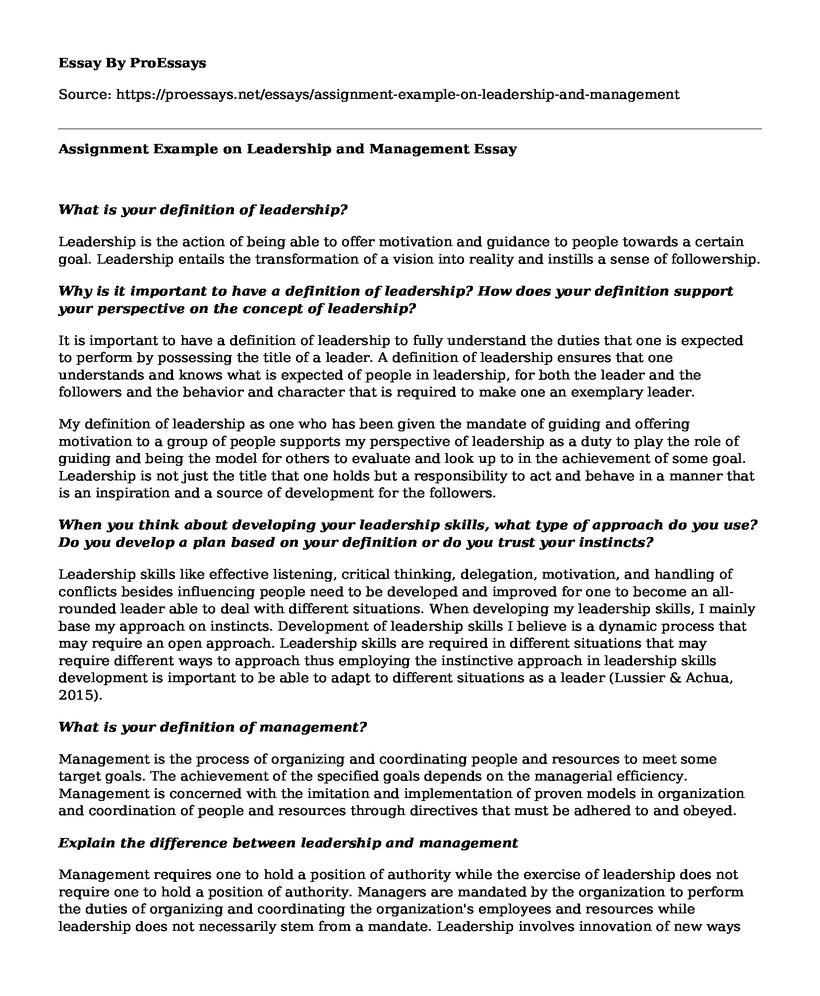What is your definition of leadership?
Leadership is the action of being able to offer motivation and guidance to people towards a certain goal. Leadership entails the transformation of a vision into reality and instills a sense of followership.
Why is it important to have a definition of leadership? How does your definition support your perspective on the concept of leadership?
It is important to have a definition of leadership to fully understand the duties that one is expected to perform by possessing the title of a leader. A definition of leadership ensures that one understands and knows what is expected of people in leadership, for both the leader and the followers and the behavior and character that is required to make one an exemplary leader.
My definition of leadership as one who has been given the mandate of guiding and offering motivation to a group of people supports my perspective of leadership as a duty to play the role of guiding and being the model for others to evaluate and look up to in the achievement of some goal. Leadership is not just the title that one holds but a responsibility to act and behave in a manner that is an inspiration and a source of development for the followers.
When you think about developing your leadership skills, what type of approach do you use? Do you develop a plan based on your definition or do you trust your instincts?
Leadership skills like effective listening, critical thinking, delegation, motivation, and handling of conflicts besides influencing people need to be developed and improved for one to become an all-rounded leader able to deal with different situations. When developing my leadership skills, I mainly base my approach on instincts. Development of leadership skills I believe is a dynamic process that may require an open approach. Leadership skills are required in different situations that may require different ways to approach thus employing the instinctive approach in leadership skills development is important to be able to adapt to different situations as a leader (Lussier & Achua, 2015).
What is your definition of management?
Management is the process of organizing and coordinating people and resources to meet some target goals. The achievement of the specified goals depends on the managerial efficiency. Management is concerned with the imitation and implementation of proven models in organization and coordination of people and resources through directives that must be adhered to and obeyed.
Explain the difference between leadership and management
Management requires one to hold a position of authority while the exercise of leadership does not require one to hold a position of authority. Managers are mandated by the organization to perform the duties of organizing and coordinating the organization's employees and resources while leadership does not necessarily stem from a mandate. Leadership involves innovation of new ways and methods of efficiency and effectiveness in business while management is primarily concerned with the administration of already known business processes and structures.
Management is involved in the development of structures and systems while leadership is concerned with the development of people. The management has to ensure that the business structures and methods work efficiently and can meet the specific goals of the business while leadership ensures that the people are well developed and able to be organized and have the motivation and belief in achieving a certain task.
Management duty is performed through control and adherence to guidance while leadership entails the inspiration of trust in the performance of duties of an organization. Management is concerned with exercising authority and power while leadership involves the development of power with other people through giving the follower a reason to believe in a specific goal or task. Management in business operates by imitation and maintenance of the processes that have been proven while leadership is concerned with invention and innovation of new methods and processes. Leadership provides room for accepting new ideas and challenging existing models and practices (Bass & Bass, 2009).
References
Bass, B. M., & Bass, R. (2009). The Bass handbook of leadership: Theory, research, and managerial applications. Simon and Schuster.
Lussier, R. N., & Achua, C. F. (2015). Leadership: Theory, application, & skill development. Nelson Education.
Cite this page
Assignment Example on Leadership and Management. (2022, May 09). Retrieved from https://proessays.net/essays/assignment-example-on-leadership-and-management
If you are the original author of this essay and no longer wish to have it published on the ProEssays website, please click below to request its removal:
- The Theory and Practice of Change Management
- Scrum Process Article Analysis Essay
- Information Security Management Assignment Paper Example
- Thomas Cook Tours Company and High-Performance Management Paper Example
- Essay Example on High Turnover Rates at Auxilio Mutuo: Crumbling Institution?
- Essay Example on Overcoming Procrastination: The Keys to Academic Success
- Essay Example on Survival in a Changing World: The Power of an Effective Strategic Plan







